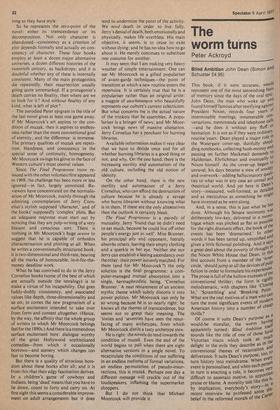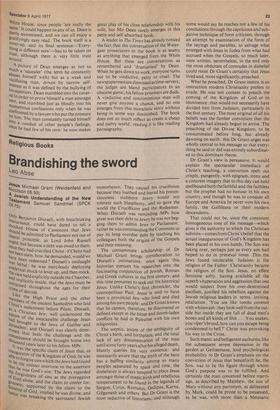The worm turns
Peter Ackroyd
Blind Ambition John Dean (Simon and Schuster £4.95)
This book, if it were accurate. would repiesent one of the most astonishing feats of memory since the days of the oral epic: John Dean, the man who woke up and found himself famous after testifying against President Nixon, records four years of interminable meetings, innumerable con" versations, memoranda and telephone calls —and he does it without any fluff or hesitation. It is not as if they were ordinarY. routine years: Dean played a major role fl the Watergate cover-up, dutifully shred' ding notebooks, collecting hush-money and passing on further blackmail demands 1° Haldeman, Ehrlichman and eventuallY t° Nixon himself. As the cover-up began 1° unravel, his days became a stew of anxict?' and overwork--adding hallucinatory quail' ties to what was in any case an unreal an.d theatrical world. And yet here is Dean s, story—measured, well-formed, as detaile° and as meticulous as something he might have Invented as he went along. And, in a sense, this is just what he 1135 done. Although his Senate testimony WaS deliberately low-key, delivered in a mo.°°logue which was pitched as flat as possible for the right dramatic effect, the book of the events has been 'dramatised.' In ocheAr words it has been tarted up, simplified an' given a little fictional polishing. And it says a great deal about the poverty of thought 1.(1 the Nixon White House that Dean, in this first account from a member of the .inner circle,' should jump at all the devices of PuIP fiction in order to formulate his experiences. The prose is full of the hollow excesses of the conventional thriller; the form is rigid. IY melodramatic, with chapters like 'Closing. En,' Scrambling' and 'Breaking Poirn. What are the real motives of a man who can turn the most significant events of modern American history into a number of elle
thrills? °
3
Of course it suits Dean's purpose as.
would-be moralist, the worm hay apparently turned: Blind Ambition Itse.1, sounds like the title of one of those WI Victorian tracts which took as .nlute delight in the evils they describe as conventional themes of recantation an! deliverance. It suits Dean's purpose, too, to turn history into melodrama. When everYn event is personalised, and when each in turn is enacting a role, it becomes ve"n difficult to ascertain motive, to apPor.c1°., praise or blame. A morality tale like th.ls 1; by implication, everybody's 5tory-111o. recent interview he professed sonic 4 belief in the reformed morals of the Cart` White House, since people are really the same.' It could happen to any of us. Dean is Partly exonerated, and we can all enjoy a gratifyingly easy read. The book itself is a enver-up, and its final sentence—'Everything is is different now'—has to be taken on trust, although there is very little trust around.
A Picture of Dean emerges as not so Much a 'squealer' (the term he constantly abuses himself with) but as a weak and vacillating man, driven by narrow selfinterest as it was defined by the bullying of hIS superiors. Dean stumbled into the coverUP in order to prove himself a man amongst men, and stumbled just as blindly into his nlomentous confessions only when he was confronted by a lawyer who put the pressure 9n him. The man constantly turned himself in. t° a conduit of other people's feelings, since he had few of his own : he now makes
great play of his close relationship with his wife, but Mo Dean rarely emerges in this petty and self-absorbed book.
A leader in The Times has already noticed the fact that the conversation of the Watergate prosecutors in the book is as seamy as anything that emerged from the White House. But these are conversations as remembered and 'dramatised' by Dean. When he gets down to work, everyone turns out to be vindictive, petty or cruel. The newspapermen are dismissed as time-servers ; the judges are bland participators in an obscene game; his fellow prisoners are duds. A vindictive and sanctimonious man will never give anyone a chance, and no one emerges from this moralistic story without being in some way diminished. The book does not so much reflect as create a cheap and paltry world; reading it is like reading pornography.

































 Previous page
Previous page